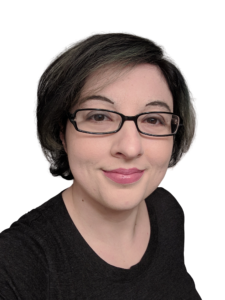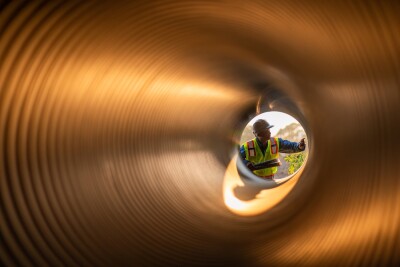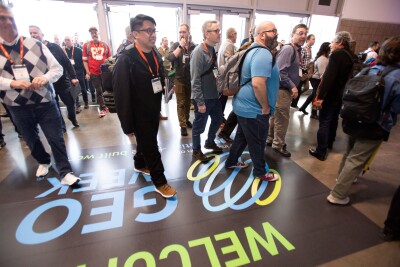You've probably already heard that the Geo Week call for speakers is open, but I wanted to reach out to you, reader, to encourage you to apply this year. I meet people every year who express regret that they didn't apply, or didn't think they had anything to talk about. I'm here to tell you - as the Content Manager for Geo Week - you're wrong about that.
Here's five great reasons to put in a talk, in no particular order:
1) You’ve figured out a solution to something frustrating
You’ve done it. Something that’s been bothering you in your workflow, that slow, annoying, or tedious bit of your work has been markedly improved by your innovation. Whether you put a new tool to work, changed a process, or embraced some automation or even AI, you’ve done it! The audience at Geo Week is full of similar or even identical frustrations, and they’re in search of solutions. As a real-world expert in your own workflows, you are the best person to tell them about how to fix that pesky problem or to make their work lives easier. We want to hear all kinds of innovative solutions and success stories, and so does our audience. Share that hard-earned knowledge by putting in a talk.
2) You have some well-earned opinions
Sure, there are many people out there with opinions on geospatial and built world technology, but how many people know those workflows and use cases like you do? Geo Week always makes room for panels discussing experiences, opinions and viewpoints that are useful to the Geo Week audience and to the industry as a whole. We know that there are so many of you out there with a lot to say, and frankly, we want to hear it! Put your most strongly-held opinions out there and share your experiential wisdom with our audience. You can establish your thought leadership, make connections with like-minded professionals, and have the opportunity to showcase multiple sides to the questions facing our industries today.
3) You tried a new technology or process and learned from it
Trying any new technology comes with a certain set of risks - what if you’ve invested money and it doesn’t work? What if the results aren’t as good as promised? But it also comes with a lot of rewards when you find a workflow that saves time, increases safety, or gives you a better deliverable at the end. For those of us who get to trial new tech and see how they might fit into their workflows, sharing what you’ve experienced firsthand is incredibly valuable. You can not only share your lessons learned, but talk to others who may have had some experience themselves, or are looking to know where to begin. No one is an expert on every single new, cutting-edge technology - but you are an expert on your work, and can evaluate how that new technology fits into your own work. These types of lessons and use cases are the core of Geo Week content, and we love to find places for these lessons to be shared.
4) You’re working on something awesome
Let’s face it. Some of the most fun things to hear about are the projects that are just awesome for one reason or another. Maybe it’s working on a historical or important place, or some place that few eyes have ever seen. Maybe it’s the scale of it - doing something larger or more ambitious than ever before. Maybe it’s about complexity, and how intellectually challenging it is to make sure you’re able to capture what you need when there’s a lot of options. Or, maybe it’s just something you’ve found personally fun, rewarding or interesting in its own right.
In previous Geo Week iterations, we’ve heard about everything historical places like the Selma Bridge or Monticello, huge ambitious projects on dams, stadiums and cities, natural wonders like Monarch Butterfly Sanctuaries and underground cave systems, and everything in between. If you’re working on something that interests you and keeps you engaged, chances are our audience will be engaged by it too.
5) You love looking ahead
While no one can completely and accurately predict the future, that doesn’t mean that people who are veterans of industry don’t have a sense of what’s coming, or feel the excitement of possibilities when it comes to technological breakthroughs. At Geo Week, we have presentations, panels, and mixes of both where the future will specifically be discussed. What do we need to know about what’s coming down the road? What hasn’t been solved yet, that needs to be? What will the impacts be to my work when a certain technology becomes more mature or widespread? And what are the exciting potential applications for these new technologies that we maybe haven’t even thought of yet? Your experience, your opinions, and your passions will define that future, and Geo Week aims to give a place for those very ideas to be discussed, for connections to be made, and for the groundwork to be laid for what’s ahead.
Submit Now
Still hesitating? Here’s a few things to know:
If you have an idea, but aren’t sure if you can finalize your abstract, submit what you can (including a description of what you think you want to talk about). We’re happy to have further discussions to develop a talk, and still want to hear from you even if you haven’t gotten the final description just right.
If you will need approval before attending/committing - submit anyway. We always confirm with speakers that they are able to attend before putting any of their information on the conference program.
If you think you want someone to speak with you (co-speaker) or want someone to speak on your behalf, but need time to connect with them - submit anyway. We will confirm any co-speakers when we reach back out in September, which should be enough time for you to have a chat with them.
If you only think that you partially fit into the categories and topics covered by Geo Week - submit anyway. Sometimes topics come up that we don’t have a predetermined fit for, but are relevant enough to put them in. It’s okay to apply even if you only think you’re partially there - you might be right on the mark!
If you are a young professional or someone traditionally underrepresented in tech who is hesitating because you have not spoken at a conference before - submit anyway! We love putting new voices on our conference program each year, and would very much like to hear what you have to say!






